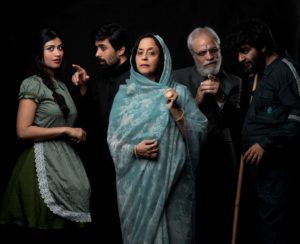Bratya Basu’s Play: Rani Creusa
Playwright: Bratya Basu
Director: Sujan Mukhopadhyay
Group: Chetana, Kolkata
Language: Bengali
Duration: 2 hrs 10 mins
The Play
The childless couple of ancient Athens, Greece, King Xuthus and his gorgeous wife Queen Creusa, seeks the blessing of God Boreas and then visits God Apollo’s temple in Delphi. Priestess Daphnis informs Creusa, daughter of King Erectheus, about the oracle of God Apollo that the royal couple will soon bear a male child, Doris. But till the prophecy comes true, they will have to adopt the attractive and handsome young man, Ion, who has grown up in the temple and crown him the prince of Athens. While King Xuthus happily agrees to obey the divine command, the Queen does not. As the King goes ahead with the plan of the adoption ceremony Creusa loses her cool and conspires with her servant Danius to kill Ion by poisoning his drink. Danius fails to carry out her order and gets caught red handed. Aghast, Ion returns to the temple of Delphi. Creusa admits her role in this conspiracy publicly. King Xuthus has no option but to initiate the trial for justice in a democracy. The arguments and counter arguments in the trial come to an abrupt end after the sudden appearance of Delphi’s chambermaid, Pythia. The truth about Ion’s birth leaves the royal couple stunned and overwhelmed…
Director’s Note
There lies an innate resemblance in almost all the stories of tragedy of human conflicts and political conspiracies; and of the great wars waged by men. The most significant resemblance lies in their staying relevant throughout the years. Therefore, to rediscover the age-old mythical tale of ‘Ion and Creusa’, Bratya Basu penned Queen Creusa, a tragic-satire. In the play, where the people demand retribution for a sacrilegious crime committed by the Queen herself, the hypocrisies of the elite are elucidated and illuminated as the fallacies hidden in the constitutional structure.
The Director
Sujan Mukhopadhyay has acted in about 30 plays and written several scripts for theatre, television and cinema. He was awarded the Stagecraft Award for Ghasiram Kotwal and Popular Viewer’s Choice Award for Don..Take Bhalo Lage. He has performed in Mumbai, Pune, Hyderabad, Nagpur, Chennai and all the major cities of India, as well as USA. He has also directed a Bengali feature film Chocolate (available on Netflix).
The Playwright
Bratya Basu is an accomplished theatre artist, a playwright and director who started his career as a sound operator. He is a theatre thinker and activist, and has served Bengali theatre for nearly 20 years. His plays have been staged by eminent directors and a compilation of his plays has been published in three volumes.
The Group
Chetana was founded in 1972. It has produced 33 full-length Plays and 13 short Plays in its journey of 46 years. Chetana received numerous awards and citation from various cultural institutions. It has organised a number of Theatre Festivals, Seminars and Workshops etc., and performed in all the districts of West Bengal and in almost all the major cities of India. Chetana has staged different plays in the Theatre Festivals organised by the National School of Drama and Sangeet Natak Akademi. It has toured USA and Canada with its productions in 1980 and 1990. Chetana performed Mareech Sangbad in Bourdeaux (France) in 1999. Sponsored by the ICCR it took part in the Ibsen International Theatre Festival held in Oslo (Norway) in 2004 and performed in London (UK) the same year.
Cast & Credits
Rani Creusa Nivedita Mukhopadhyay
Glaucas Supriya Dutta
Raja Xuthus Shaheb Chattopadhyay
Ion Subhra Sourav Das
Eziptus Tarun Bhattacharyya
Senior Priest Amitabha Ghosh
Danaus Sushovan Guha
Orion Rahul Sen Roy
Petroclus Rajat Narayan Bhattacharya
Clotho Somrashmi Ghosh
Lachesis Monalisa Das
Atropos Ashmita Ghosh
Pythia Ruma Bakhuli
Daphnis Santwana Banerjee
Singer Daayaad Mukherjee
Chorus Parikshit Ghosh, Debashis Naskar, Biswajit Nayak, Prateek Banerjee, Parag Roy, Sayan Maji
Music Prabuddha Banerjee
Light Soumen Chakraborty
Sound Anindyo Nandy
Costume Prabal Mondal
Make-up Ayon Ghosh
Set Partha Majumdar
Vocalists Dipanwita Chowdhury, Dibyendu Mukherjee, Sujan Mukhopadhyay, Shaheb Chattopadhyay, Prabuddha Banerjee, Bodhisattwa Banerjee
Assistant Director Snehansu Biswas
Playwright Bratya Basu
Director Sujan Mukhopadhyay
Contacts
Chetana
131, N.S.C. Bose Road, Govt. Housing Est.
Block-7, Flat 2 Kolkata – 700040, West Bengal
M: +91 9433075751, 9830253530
E: chetanakolkata.1972@gmail.com
sujanmukhopadhyay@gmail.com
Watch Prof. Khushalani’s review of the play and interview with the director –
https://youtu.be/9x4IIdxNTPU?t=3724



